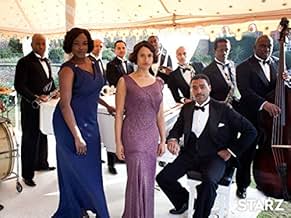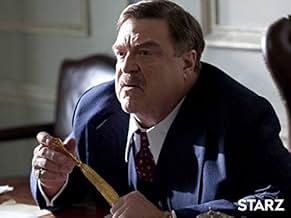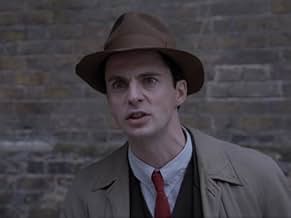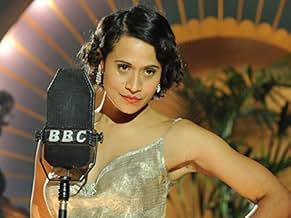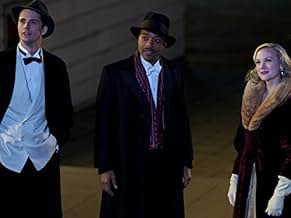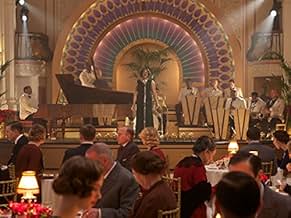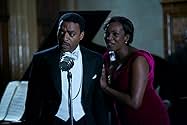IMDb-BEWERTUNG
7,4/10
2931
IHRE BEWERTUNG
Füge eine Handlung in deiner Sprache hinzuSet in the 1930s, a black Jazz band rises in fame and popularity while becoming entangled in an intricate web of intrigue, mystery and suspense with the elite of London society.Set in the 1930s, a black Jazz band rises in fame and popularity while becoming entangled in an intricate web of intrigue, mystery and suspense with the elite of London society.Set in the 1930s, a black Jazz band rises in fame and popularity while becoming entangled in an intricate web of intrigue, mystery and suspense with the elite of London society.
- Für 1 Primetime Emmy nominiert
- 5 Gewinne & 16 Nominierungen insgesamt
Folgen durchsuchen
Empfohlene Bewertungen
For so many people not liking this, it has a high rating here on IMDb. I enjoyed it but see its flaws.
I am not familiar with the work of Stephen Poliakoff, so I can't comment on the criticisms of him.
The series is about a black jazz band in the 1930s who is discovered by a music journalist, Stanley Mitchell (Matthew Goode). With Wesley's help, the group is booked at the upscale Imperial Hotel and even entertain Prince George (erroneously described during the program as the Prince of Wales, who was actually Edward, Prince of Wales).
The band becomes successful and is written up often by Mitchell. With two talented singers (Wunmi Mosaku and Angel Coulby), they come to the attention of a record company and radio. But tragedy strikes, and the ensuing events threaten to ruin the band.
I'm at a disadvantage here because I'm not familiar with early '30s jazz music, but the critiques say the music presented is actually from a decade later. The songs are original to the production, which were also criticized. The producers certainly could have found actual songs, but I suppose they didn't want to pay for the rights. A couple of the songs weren't very good.
It's an expensive production with some excellent actors: Goode, who I've always loved, Chiwetel Ejiofor as Louis Lester, the leader of the band, Anthony Head, John Goodman, Tom Hughes, and Jacqueline Bisset. Very formidable.
There was also criticism that the series did not really evoke the '30s. I thought it looked wonderful, particularly the hotel scenes. But I agree, there was something missing in the period feel.
Fascinating to me was the statement in the series that the Brits didn't know what Americans sounded like until the advent of talking pictures, as well as the talk of the wireless. One really does get the feeling of limited communication and how far we've come.
Suspenseful, well-acted, this could have been more fascinating with some stronger writing, attention to period details, and maybe some cutting, perhaps to four episodes instead of six.
The research wasn't perfect -besides the Prince of Wales ID, there was also the reference to Clark Gable. In 1933, Clark Gable was just coming onto the radar in the U. S. Ronald Colman would have been much better. The devil is in the details.
I am not familiar with the work of Stephen Poliakoff, so I can't comment on the criticisms of him.
The series is about a black jazz band in the 1930s who is discovered by a music journalist, Stanley Mitchell (Matthew Goode). With Wesley's help, the group is booked at the upscale Imperial Hotel and even entertain Prince George (erroneously described during the program as the Prince of Wales, who was actually Edward, Prince of Wales).
The band becomes successful and is written up often by Mitchell. With two talented singers (Wunmi Mosaku and Angel Coulby), they come to the attention of a record company and radio. But tragedy strikes, and the ensuing events threaten to ruin the band.
I'm at a disadvantage here because I'm not familiar with early '30s jazz music, but the critiques say the music presented is actually from a decade later. The songs are original to the production, which were also criticized. The producers certainly could have found actual songs, but I suppose they didn't want to pay for the rights. A couple of the songs weren't very good.
It's an expensive production with some excellent actors: Goode, who I've always loved, Chiwetel Ejiofor as Louis Lester, the leader of the band, Anthony Head, John Goodman, Tom Hughes, and Jacqueline Bisset. Very formidable.
There was also criticism that the series did not really evoke the '30s. I thought it looked wonderful, particularly the hotel scenes. But I agree, there was something missing in the period feel.
Fascinating to me was the statement in the series that the Brits didn't know what Americans sounded like until the advent of talking pictures, as well as the talk of the wireless. One really does get the feeling of limited communication and how far we've come.
Suspenseful, well-acted, this could have been more fascinating with some stronger writing, attention to period details, and maybe some cutting, perhaps to four episodes instead of six.
The research wasn't perfect -besides the Prince of Wales ID, there was also the reference to Clark Gable. In 1933, Clark Gable was just coming onto the radar in the U. S. Ronald Colman would have been much better. The devil is in the details.
This television series from the celebrated Stephen Poliakoff portrays 1930s upper class London but focuses on a Black Jazz band travelling the clubs of Britain.
They mix with the high ups of polite British society but reveals an underbelly of prejudice, secrets and murder.
Chiwetel Ejiofor plays Louis Lester, trained in the USA but his jazz band takes London by storm when armed with two female singers.
Matthew Goode plays a music journalist who champions the band in his music paper. John Goodman turns up as a mogul who wants to buy newspapers.
Although there are twists and turns, Poliakoff needs to stick to writing. He needs a stronger story editor and get someone else to direct and interpret his words to the screen.
It looks good, there is a fine all star cast from Jacqueline Bisset, Jane Asher, Anthony Head. The music and songs which was written specially for the series is fine with a few memorable tunes but it meanders too much.
The murder story has little mystery as you have a rough idea who the culprit might be.
They mix with the high ups of polite British society but reveals an underbelly of prejudice, secrets and murder.
Chiwetel Ejiofor plays Louis Lester, trained in the USA but his jazz band takes London by storm when armed with two female singers.
Matthew Goode plays a music journalist who champions the band in his music paper. John Goodman turns up as a mogul who wants to buy newspapers.
Although there are twists and turns, Poliakoff needs to stick to writing. He needs a stronger story editor and get someone else to direct and interpret his words to the screen.
It looks good, there is a fine all star cast from Jacqueline Bisset, Jane Asher, Anthony Head. The music and songs which was written specially for the series is fine with a few memorable tunes but it meanders too much.
The murder story has little mystery as you have a rough idea who the culprit might be.
No idea what to expect, but became totally hooked for these reasons: 1. Intelligent dialogue and storyline. A very well researched period piece dealing with both early 20th century British culture (a little American too); influence of music in culture (in this case mostly jazz); aristocracy relations with the poor (things never change); black (and other groups) relations with white power (money, politics, etc.). 2. Superb acting. 3. Superb period singing and accompanying music. 4. Most importantly for a quality film is attention to detail. 5. Suspenseful drama (Whodunit?). 6. Left room for a continuation which, unfortunately, doesn't appear to be in the works. 7. Interesting final episode of tidying up loose ends, even interviewing the dead as if they never died.
Good points: Matthew Goode was excellent in his role as Stanley. His character was original and he carried the show, in my opinion. Most of the others were all right and did what they could with the material. The story kept me watching and interested to the end.
Bad points: It took place in a depopulated London (reminding me of 'Survivors' or 'Day of the Triffids') and never convinced me for a second that it was 1933. The tame music seemed very unlikely to offend anybody at that date, when much 'hotter' jazz had been available for at least a decade previously. Some of it sounded more like the swing music of the forties. Tom Hughes' character and acting was ho-hum. The hiding from the police became silly and unbelievable in the last episode.
Like others, I cannot understand why the BBC think this director is something special and throw money in his direction. But it's worth seeing.
Bad points: It took place in a depopulated London (reminding me of 'Survivors' or 'Day of the Triffids') and never convinced me for a second that it was 1933. The tame music seemed very unlikely to offend anybody at that date, when much 'hotter' jazz had been available for at least a decade previously. Some of it sounded more like the swing music of the forties. Tom Hughes' character and acting was ho-hum. The hiding from the police became silly and unbelievable in the last episode.
Like others, I cannot understand why the BBC think this director is something special and throw money in his direction. But it's worth seeing.
British acting royalty on full display here. Plus some welcome imports such as John Goodman. Jenna Colman and Tom Hughes before the mega-success that was Victoria. Jenna looking surprisingly unremarkable, but her voice is memorable. Before Doctor Who fame clearly.
I had this somewhere on the periphery for many, many years but since I couldn't find a version with decent subtitles I just left it there. I don't know what attracted me to it in the first place, whether it was Matthew Goode or the period aspect. Couldn't have been the topic itself I don't think.
Anyway, it starts as an underdog story and it morphs into an anatomy of the very upper class in Britain, up to the royals. Their vain, empty pursuits and lack of accountability. Up to an including the most heinous of acts.
In any case it was captivating for the most part, both the underdog stories and the upper crust slumming it and mixing with black jazz players. I thought they were dragging their feet and overdramatizing the last couple of episodes. Once you get a hint of what's really going on it really drags its feet to conclusion, but it still has some wonderfully tense moments.
I have about 20 minutes more of the last episode, the interview format, but basically you can do without that one, it does not add much.
Probably more of a 7 overall but I just love the genre. And the music slapped. Plus, if you love British shows and British actors you can't miss this one.
I had this somewhere on the periphery for many, many years but since I couldn't find a version with decent subtitles I just left it there. I don't know what attracted me to it in the first place, whether it was Matthew Goode or the period aspect. Couldn't have been the topic itself I don't think.
Anyway, it starts as an underdog story and it morphs into an anatomy of the very upper class in Britain, up to the royals. Their vain, empty pursuits and lack of accountability. Up to an including the most heinous of acts.
In any case it was captivating for the most part, both the underdog stories and the upper crust slumming it and mixing with black jazz players. I thought they were dragging their feet and overdramatizing the last couple of episodes. Once you get a hint of what's really going on it really drags its feet to conclusion, but it still has some wonderfully tense moments.
I have about 20 minutes more of the last episode, the interview format, but basically you can do without that one, it does not add much.
Probably more of a 7 overall but I just love the genre. And the music slapped. Plus, if you love British shows and British actors you can't miss this one.
Wusstest du schon
- WissenswertesJenna Coleman and Tom Hughes would go on to star together as Queen Victoria and Prince Albert in the ITV period drama Victoria (2016).
- PatzerThe musical style of Louis Lester's band, and especially the vocal styles of his singers and the sorts of songs they perform, are typical of the 1950's, not the 1930's.
- VerbindungenFeatured in The Wright Stuff: Folge #18.20 (2013)
Top-Auswahl
Melde dich zum Bewerten an und greife auf die Watchlist für personalisierte Empfehlungen zu.
- How many seasons does Dancing on the Edge have?Powered by Alexa
Details
- Erscheinungsdatum
- Herkunftsland
- Sprache
- Auch bekannt als
- 邊緣之舞
- Drehorte
- Severn Valley Railway, Shropshire, England, Vereinigtes Königreich(Folkestone and South Bromley stations)
- Produktionsfirmen
- Weitere beteiligte Unternehmen bei IMDbPro anzeigen
Zu dieser Seite beitragen
Bearbeitung vorschlagen oder fehlenden Inhalt hinzufügen




